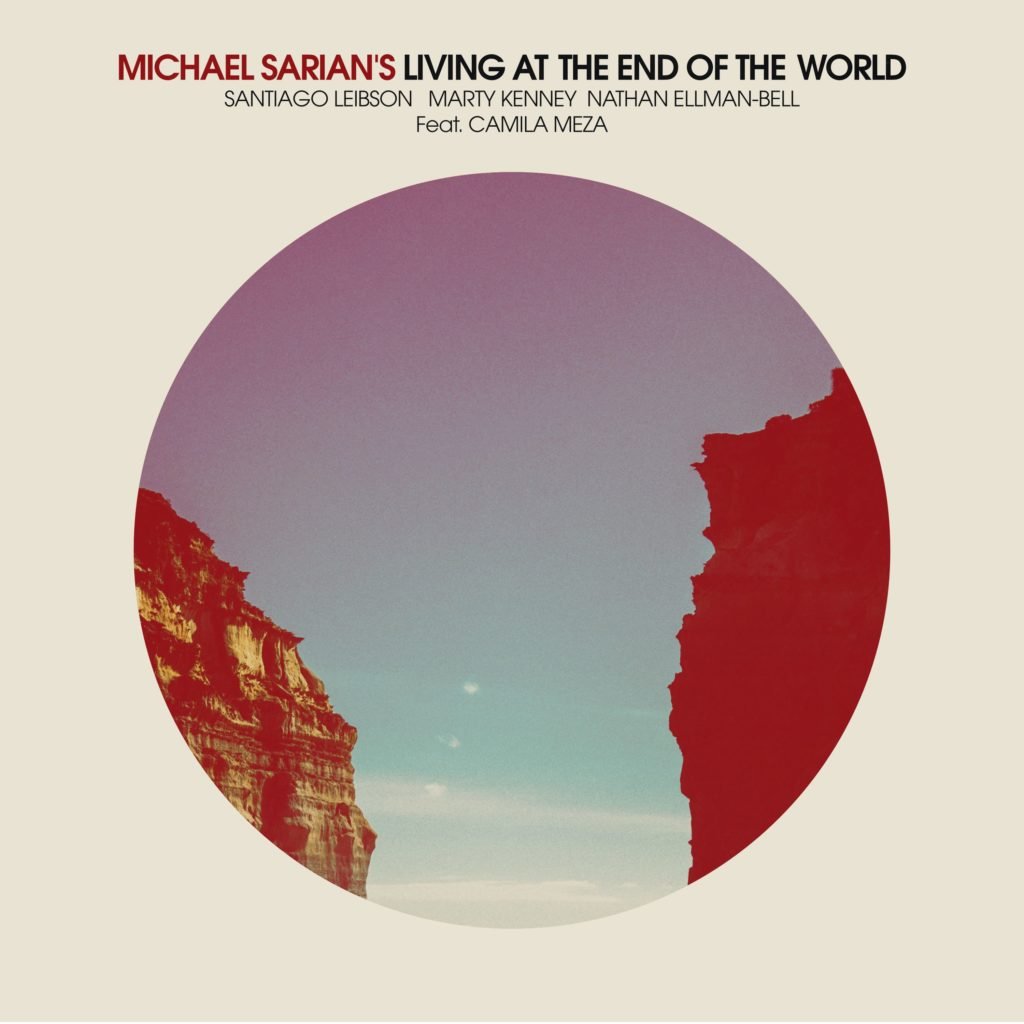 Living at the End of the World is trumpeter/composer Michael Sarian’s follow up to his 2020 acclaimed album New Aurora. Inspired by trumpet greats such as Tomasz Stańko, Enrico Rava and legendary Armenian-American drummer Paul Motian, it marks Sarian’s second foray into a style that explores the intersections between composed music and spontaneous creation, negotiating melodies and harmonies with free improvisation. Joining Saryan on this journey are longtime collaborators, pianist Santiago Leibson, bassist Marty Kenney, drummer Nathan Ellman-Bell and the acclaimed Chilean guitarist, vocalist and composer Camila Meza.
Living at the End of the World is trumpeter/composer Michael Sarian’s follow up to his 2020 acclaimed album New Aurora. Inspired by trumpet greats such as Tomasz Stańko, Enrico Rava and legendary Armenian-American drummer Paul Motian, it marks Sarian’s second foray into a style that explores the intersections between composed music and spontaneous creation, negotiating melodies and harmonies with free improvisation. Joining Saryan on this journey are longtime collaborators, pianist Santiago Leibson, bassist Marty Kenney, drummer Nathan Ellman-Bell and the acclaimed Chilean guitarist, vocalist and composer Camila Meza.
Developed during much of 2020 and into 2021, the initial inspiration for Living at the End of the World came (as it had for the initial track on New Aurora) from Japanese author Haruki Murakami and his book Hard-Boiled Wonderland and the End of the World, wherein the main character spends half of the novel in a town called ‘The End of the World.’ Sarian was deeply engrossed in this book during the pandemic as the world was seemingly coming to an end, giving the trumpeter a different perspective on what the end of the world could be. “Instead of the world as we know it coming to an end, we could approach it as simply a new, temporary space we are living in,” says Sarian. “Still a menacing, other-worldly space, but not without hope.” The title track itself conveys this polarity, a bluesy shuffle with contrasting sections, and an open solo section in which Leibson completely destroys any semblance of form on the Rhodes and Minimoog, only to bring us back to the surface again.

“Yi Ku Ghimetn Chim Kidi” (I Don’t Know Your True Value) is an arrangement of a piece by Sayat Nova, an 18th century Armenian poet and troubadour. There is a sense of longing and melancholy that is practically built into the melody, and just like the melodies of so many great Armenian composers, it shines on its own. The melody remains true to Sayat Nova’s, with Sarian’s arrangement providing harmonic support moving it forward, emphasizing the sorrow and longing in the composition which bleeds into Leibson’s and Sarian’s solos.
Sarian does not shy away in his admiration for pioneering trumpeters such as Enrico Rava and makes note of it on The Pilgrim, dedicated to Rava and named after the trumpeter’s 1975 album The Pilgrim and The Stars. A nearly seven-minute track of tension building with little release, the seven sixteenth-note pickup to this melody is what gave the piece its start, after Sarian heard Rava play it in his solo on the tune “Bella.”
In 2018, Sarian was fortunate to perform with his septet at the BRIC JazzFest in Brooklyn, the same night as none other than Meshell Ndegeocello. He was immediately enthralled by her music and spent months listening to her album Weather, particularly the track “Oysters.” It would take a few years, but Sarian finally decided to add the tune to his repertoire, wrapping the beautiful melody around an open improvisation section featuring the rhythm section.
Since setting his septet The Chabones aside to focus on working with his quartet, Sarian moved away from incorporating South American rhythms in his music, which was fairly common in his earlier work. Composed during a stay at a friend’s house in Woodstock, NY, Maverick Road sees a return to that 6/8 feel after a soaring intro and broad A section.
In 2020, Argentine actress, singer, songwriter and creative Belén Pasqualini approached Sarian with the idea of collaborating on a piece of music, using her words as a jumping off point for his music. A few months later, Sarian finished working on “Cinta Marina.” Inspired by William Parker’s work, Sarian chose to maintain a light and minimalist aesthetic, letting the words shine, and giving the vocalist freedom to pace and interpret the story of a young girl’s relationship with the ocean. No doubt an album highlight are Meza’s vocals and guitar playing on this track.
Written for his brother’s dog Pickle, “Picklepuss Romp” showcases Ellman-Bell throughout. Starting out on a second-line groove in 7, the playful melody twists into an aggressive, off-beat hip hop rhythm before heading into the solo section, where group interplay really shines.
Before COVID-19 paralyzed the world, one of 2020’s first tragedies moved Sarian to compose what would be the first in this series of tunes. Kobe Bryant’s passing brought out mixed emotions for so many, and so, “Regarding Kobe” tries to convey an uneasy sadness, but ultimately a sense of calm and comfort, creating a welcoming space for group improvisation.
Finally, the last track of the album is another dedication, in this case for Sarian’s close friend Max, who passed away in July of 2020. A halftime spiritual/Americana tune with a couple of twists and turns, Leibson introduces the melody, with Sarian, Kenney and Ellman-Bell joining in one by one. Kenney delivers a truly beautiful bass solo, with Sarian’s flugelhorn bringing us home at the end.



Be the first to comment